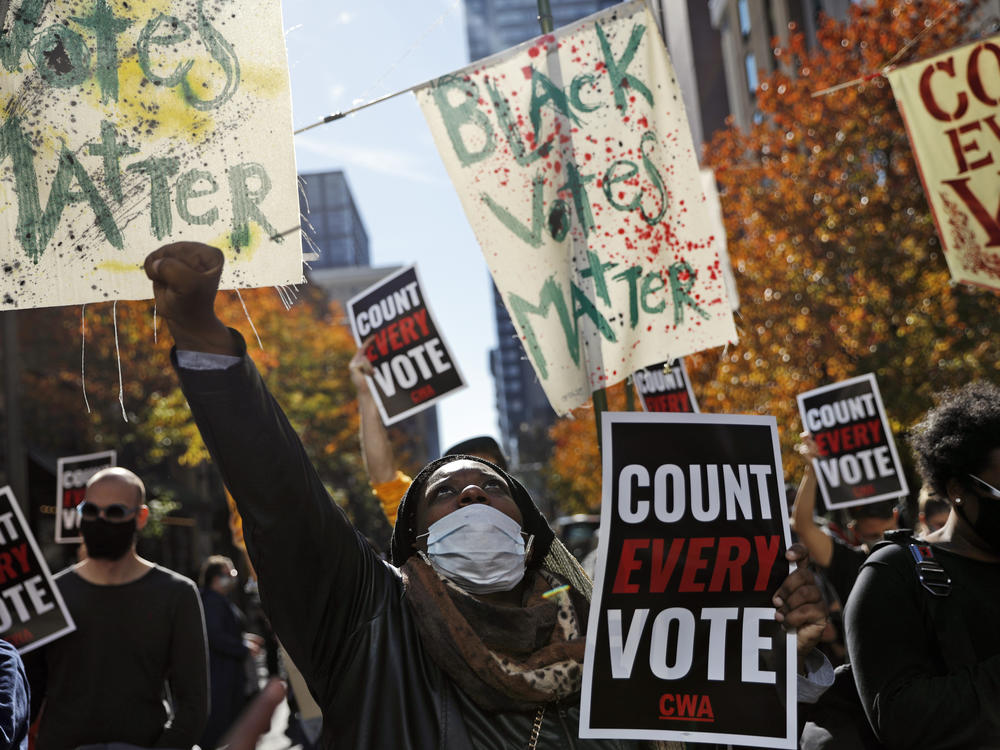Section Branding
Header Content
Trump Push To Invalidate Votes In Heavily Black Cities Alarms Civil Rights Groups
Primary Content
When Joe Biden thanked Black voters in his first remarks as president-elect, he credited them with lifting his campaign from its lowest point during the Democratic primaries.
"You've always had my back, and I'll have yours," he promised.
While Biden won Black voters overwhelmingly across the country, they were key to his victories in Michigan, Wisconsin, Pennsylvania and Georgia — places where President Trump and his allies have been targeting ballots in cities with large Black populations in an attempt to overturn the president's defeat and retain power.
Trump's campaign and his allies have presented no real evidence of widespread voter fraud or other impropriety in any of these cities, and they have faced multiple defeats in court. But the persistence of the president and loyal Republicans has alarmed Black leaders, civil rights activists and historians who see an unprecedented attempt to disenfranchise hundreds of thousands of voters, many of them Black.
The president's campaign has denied racial motivations in its lawsuits, saying that its recount strategy is not targeting Black voters.
Jenna Ellis, the Trump campaign's senior legal adviser, said in a statement to NPR that "every American deserves to know that our elections are conducted in a legal manner, no matter who they are or where they live."
"That's our only goal: to ensure safe, secure, and fair elections," Ellis added. "That's what our Constitution requires."
But Bob Bauer, a senior legal adviser to the Biden campaign, said the Trump campaign's "targeting of the African American community is not subtle. It is extraordinary" and that "it's quite remarkable how brazen it is."
"This is straight out, discriminatory behavior," Bauer told reporters on Friday.
A group of Michigan voters has also filed a lawsuit against Trump and his campaign, arguing that "defendants are openly seeking to disenfranchise Black voters," including those in Detroit.
The plaintiffs, who are represented by lawyers from the NAACP Legal Defense Fund, allege that the Trump campaign has attempted mass voter suppression by pressuring election officials into not certifying the election results in their state, and that Trump's apparent attempt to pressure Michigan election officials and state lawmakers was a violation of the provision against voter intimidation included in the Voting Rights Act of 1965.
"Defendants' tactics repeat the worst abuses in our nation's history, as Black Americans were denied a voice in American democracy for most of the first two centuries of the Republic." the lawsuit said.
Trump and his allies have made similar efforts in Pennsylvania, with false claims about widespread voter fraud in Philadelphia. There have been charges leveled against the electoral process in Atlanta as the political universe is focused on Georgia ahead of two runoff elections that will determine control of the U.S. Senate. In Wisconsin, the Trump campaign has called for a recount of ballots in the diverse, large counties of Milwaukee and Dane, which put Biden over the top there, but the Trump campaign did not ask for recounts in the rest of the state's whiter counties.
To many civil rights advocates, this is another grim chapter in what they see as an expansive, decades-long effort by Republicans to gain more power by suppressing the votes of people of color.
"It is difficult for me to think of another president in modern time who has literally driven a national scheme to disenfranchise Black voters and other voters of color en masse, in the way that we see with these post-election lawsuits," said Kristen Clarke, president and executive director of the Lawyers' Committee for Civil Rights Under Law. She said there was "racial motivation" in Trump's focus on cities like Detroit, Philadelphia and Atlanta.
Trump's attempts hit a significant roadblock on Monday as Michigan's state canvassing board certified Biden's victory with one of the board's two Republican members abstaining.
Derrick Johnson, the president of the NAACP, called that action "appalling." He pointed out that the Trump campaign was aided by supporters and allies across the country in his failed efforts to reverse Biden's victory.
"It's only because of the environment that was created by this president to defy the rule of law, to destroy customs and practices, and to really push people toward a sense of tribalism that's not in our economic interest, that's not in the interest of democracy, for his own selfish and self-reflecting outcome," Johnson said in an interview. "And it's unfortunate that there have been so many people willing to put their character, their integrity at stake for such activity."
Andra Gillespie, a political science professor at Emory University, said voter suppression is typically thought of as rules or practices that, when put in place, have the impact of making people of color less likely to vote than their white counterparts.
The effort that Trump is undertaking, she said, is a new type of attempted voter suppression in which the president is attempting to invalidate ballots that have already been counted.
"I think he has targeted heavily African American cities because they happen to be heavily Democratic cities, and if he's going to invalidate enough votes to turn the election in his favor, this would actually be the best place to do it," Gillespie said.
Trump's attempt to overturn the election result comes at the end of an election season in which the nation elected its first Black vice president, California Sen. Kamala Harris. It also comes at the end of the year where many voters, particularly voters of color, faced unprecedented obstacles to cast ballots due to the coronavirus pandemic.
With the election challenges serving as a sort of punctuation mark on all of that, Clarke said, "I think this will stand out in the history books as one of the darkest moments in our nation's history."
Copyright 2020 NPR. To see more, visit https://www.npr.org.

